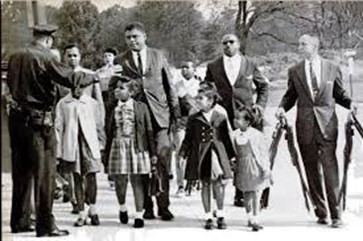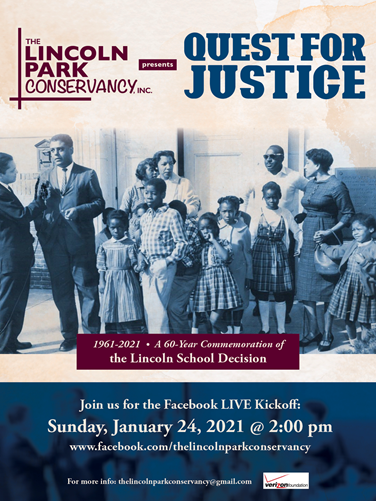QUEST FOR JUSTICE: A 60-Year Commemoration of the Lincoln School Decision

When most of us think about the Civil Rights Movement of the 1960s, we tend to think of places like Selma and Montgomery in Alabama, and Little Rock, Arkansas. Most of us do not realize that the State of New York had its own long-standing struggles with the integration of African-Americans and other people of color. In the 1960’s, the City of New Rochelle in Westchester County became the epicenter of the struggle to integrate public schools in the North. As epitomized on the front-page cover of the nationally distributed Life Magazine, New Rochelle was described as the “Little Rock of the North.”
On January 24, 1961, Judge Irving R. Kaufman of the U.S. District Court for the Southern District of New York rendered his decision in Taylor v. Board of Education of City School District of New Rochelle. Judge Kaufman ruled that the New Rochelle Board of Education had deliberately created and maintained the Lincoln School as a racially segregated school. This decision, which was the first school desegregation case won in a northern federal court post Brown v. Board of Education, would be the foundation and catalyst for school desegregation cases throughout the North.

For me this case will always have a profound and personal impact. As well as its importance in the framework of racial integration in our Nation’s schools, the case would have a deep and lasting impact on my family. When a group of mothers from New Rochelle decided enough was enough, they looked to a brash young attorney who had just represented parents from Harlem, New York in their boycott of inferior Harlem schools. That lawyer happened to be my late father, Paul B. Zuber.
Taylor would catapult my father into the national limelight and he would go on to handle similar legal cases throughout the country. In Taylor, my father saw the opportunity to test the principals of Brown in the North. The case would be the foundation of litigation in the North and the decision would force the NAACP Legal Defense Fund to change a litigation strategy that solely focused on southern states. After Taylor, the NAACP would begin an aggressive litigation strategy in the North.
Taylor is profound and relevant on so many different levels. From a historical standpoint, the case would change desegregation legal strategy in the United States. The Taylor case is also a story that included some of the leading voices of the Civil Rights movement of its time such as Thurgood Marshall, Constance Baker Motley, Jack Greenburgh and Robert Carter. As tensions rose during the case, celebrities such as Ruby Dee and Ossie Davis would lend their immense voices to the fight. As a kid, well past this time and living in upstate New York, I would always get a kick out of Mr. Davis when he would call our house to speak to my father. His deep baritone was so rich and full. But, the point is that there was so much history to this case and its historical relevance alone is something we should cherish.
My father received a lot of credit for what he did in New Rochelle but what is sometimes lost on this case, and other school desegregation cases, is the role of women of color. It was great that my father was able to apply a strategy that would force such monumental change, but this never would have happened without the mothers who stood up to an unjust system and said they would not allow their child to have an inferior education. Like Harlem before it, Taylor is a story of Black women empowerment. They were the agents of change and the roots of their effort are found in the amazing women of color who lead us today. So, in commemorating this case we are also commemorating the sacrifices of women of color.
Finally, I often think of one of my father’s quotes during the case, “The difference between the South and the North is that in the South their racists wear white sheets, in the North our’s wear Brooks Brother suits.” I would often ask my father about that quote and he would talk to me about the insidious nature of racism when it is cloaked behind other messaging. In New Rochelle they would tell the Black community that the Lincoln School was simply a “neighborhood school.” It was not racism that dictated that the students would attend an inferior school but where they lived. Never mind that white students, who literally lived across the street from Lincoln, went to different schools. As we look back at Taylor, 60-years later, the political dog whistles of race continue to be alive, well and must be part of a deeper discussion of race.
On Monday, January 24th at 2 pm, The Lincoln Park Conservancy (TLPC) will hold a Facebook Live event to kick-off the 60th commemoration of the Taylor v. Board of Education of the City of New Rochelle (www.facebook.com/thelincolnparkconservancy). The event will include guest speakers including some of the children who were part of the Taylor case to reflect on their memories. The opening event will be a prelude to a series of events TLPC will hold culminating in May with the world premier of Leveling Lincoln (https://levelinglincoln.com), a documentary film that examines the Taylor case and its impact on those children who grew up during those times.

As a TLPC Board Member, I would like to thank Verizon for their generous donation to all us to promote this important and historic case. I would also like to thank Dan Klores Communications for providing their assistance as we navigate the public relations landscape. It is always difficult to raise funding for a not-for-profit so the efforts by these two companies is greatly appreciated. TLPC is an important part of the New Rochelle fabric. It is a not-for-profit organization based in New Rochelle that is dedicated to maintaining the rich history of the Lincoln Avenue corridor. TLPC also provides a community garden at the site of the Lincoln School where they teach sustainability to the community and healthy living. Soon the TLPC will enter a new building in New Rochelle that will be home to the Media Center. The Center will train community residents, young and old, how to produce, livestream and podcast locally produced creative content on all streaming and social media platforms. Finally, I would like to thank the leadership of Linda Tarrant-Reid, Executive Director of TLPC, for her tireless events as well as the rest of the TLPC Board of Directors.
Paul Zuber is Senior Vice President at ASA Government Affairs and a Board Member of The Lincoln Park Conservancy.
